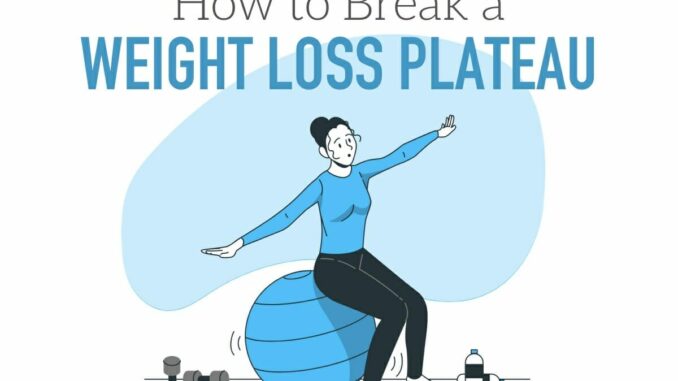
Introduction: Embarking on a weight loss journey is often filled with enthusiasm, determination, and hope for positive change. However, as many individuals experience, progress can sometimes stall, leading to frustration and disappointment. These periods, known as weight loss plateaus, are common and can occur despite diligent efforts to eat healthily and stay active. In this comprehensive guide, we’ll explore the reasons behind weight loss plateaus and provide practical strategies for overcoming them, allowing you to break through barriers and continue progressing towards your goals.
Understanding Weight Loss Plateaus: Weight loss plateaus are periods of time during which the scale stops moving despite continued efforts to eat healthily and exercise regularly. Plateaus can occur for a variety of reasons, including metabolic adaptation, changes in hormone levels, decreased muscle mass, decreased calorie intake, and decreased physical activity levels. Additionally, as you lose weight, your body may require fewer calories to maintain its current weight, making it necessary to adjust your diet and exercise routine accordingly.
Reasons for Weight Loss Plateaus:
- Metabolic Adaptation: As you lose weight, your metabolism may slow down in response to decreased calorie intake and weight loss, making it more difficult to continue losing weight at the same rate.
- Hormonal Changes: Changes in hormone levels, such as decreases in leptin (the hormone that regulates appetite) and increases in ghrelin (the hunger hormone), can affect hunger, cravings, and energy expenditure, making it harder to stick to your diet and exercise routine.
- Muscle Loss: During periods of calorie restriction and weight loss, your body may break down muscle tissue for energy, leading to a decrease in muscle mass and a slower metabolism.
- Decreased Calorie Intake: Over time, you may inadvertently decrease your calorie intake as you become more accustomed to your diet, leading to a plateau in weight loss.
- Decreased Physical Activity: As your body adapts to your exercise routine, you may burn fewer calories during workouts, leading to a plateau in weight loss.
Strategies to Overcome Weight Loss Plateaus:
- Reassess Your Diet: One of the first steps in overcoming a weight loss plateau is to reassess your diet and ensure that you’re still in a calorie deficit. Keep a food diary to track your calorie intake and identify any areas where you may be consuming more calories than you realize. Focus on eating whole, nutrient-dense foods that are rich in fiber, protein, and healthy fats to help you feel full and satisfied while staying within your calorie goals. Consider incorporating more fruits, vegetables, lean proteins, and whole grains into your diet, and limit processed foods, sugary snacks, and high-calorie beverages.
- Mix Up Your Workouts: If you’ve been following the same exercise routine for an extended period, your body may have adapted to the stimulus, leading to a plateau in weight loss. To overcome this, mix up your workouts by incorporating different types of exercise, such as cardio, strength training, and flexibility exercises. Try new activities or sports that you enjoy, such as hiking, swimming, or dancing, to keep your workouts fun and engaging. Additionally, increase the intensity or duration of your workouts to challenge your body and stimulate further progress.
- Increase Protein Intake: Protein is an essential nutrient for weight loss and muscle maintenance, as it helps to increase feelings of fullness, boost metabolism, and preserve lean muscle mass. Increase your protein intake by incorporating protein-rich foods into each meal and snack, such as lean meats, poultry, fish, eggs, dairy products, legumes, nuts, and seeds. Aim to include a source of protein in every meal and snack to help you stay satisfied and support your weight loss efforts.
- Prioritize Sleep and Stress Management: Sleep and stress play crucial roles in weight loss and overall health, so it’s essential to prioritize both to overcome weight loss plateaus. Aim for seven to nine hours of quality sleep per night to support healthy metabolism, hormone regulation, and appetite control. Practice relaxation techniques, such as deep breathing, meditation, or yoga, to help you manage stress and reduce cortisol levels, which can contribute to weight gain and retention. Make time for activities that bring you joy and relaxation, such as spending time with loved ones, pursuing hobbies, or spending time in nature.
- Practice Mindful Eating: Mindful eating involves paying attention to hunger and fullness cues, eating slowly, and savoring each bite, which can help you become more in tune with your body’s hunger and satiety signals. Practice mindful eating by eating without distractions, such as TV or smartphones, and focusing on the sensory experience of eating, such as the taste, texture, and aroma of your food. Eat when you’re hungry and stop when you’re satisfied, rather than eating out of boredom, stress, or habit. By practicing mindful eating, you can prevent overeating, reduce emotional eating, and improve your relationship with food.
- Be Patient and Persistent: Finally, remember that overcoming a weight loss plateau takes time, patience, and persistence. Don’t get discouraged if you don’t see immediate results—trust the process and stay committed to your goals. Focus on making small, sustainable changes to your diet and exercise routine, and celebrate progress, no matter how small. Keep a positive attitude and believe in yourself and your ability to overcome obstacles and achieve your goals. By staying patient and persistent, you can break through weight loss plateaus and continue making progress towards a healthier, happier you.
Conclusion: Weight loss plateaus are a common and frustrating part of the weight loss journey, but they don’t have to derail your progress. By understanding the reasons behind weight loss plateaus and implementing practical strategies to overcome them, you can break through barriers and continue progressing towards your goals. Reassess your diet, mix up your workouts, increase protein intake, prioritize sleep and stress management, practice mindful eating, and above all, be patient and persistent. With dedication, perseverance, and a positive mindset, you can overcome weight loss plateaus and achieve long-term success in your weight loss journey.